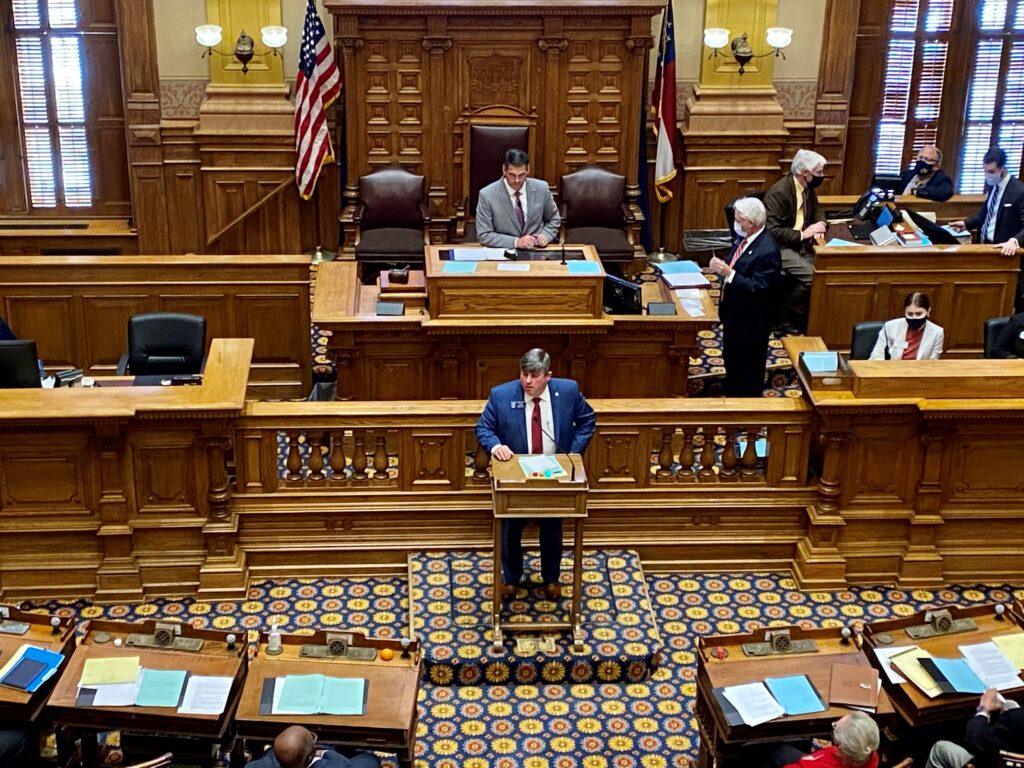
Stricter identification rules for voting by mail in Georgia inched closer to law with the state Senate’s passage of a controversial bill on Tuesday.
Sponsored by state Sen. Larry Walker III, R-Perry, the bill would require absentee voters to provide the number of their driver’s license or official state ID card, or photocopies of a passport, employee ID card, utility bill or bank statement.
It was among three bills that passed the Senate on Tuesday, marking the first election-focused measures to clear a General Assembly chamber in the 2021 legislative session.
The absentee-voting bill passed by a nearly party-line vote, as did two other measures sponsored by state Sen. Bill Cowsert, R-Athens, that would shorten the time limit for local registrars to enter voting data into the state’s voter-history system and boost reporting requirements for the state’s election-results website, including the number of absentee and provisional ballots issued, cast and rejected.
A fourth bill by state Sen. Jen Jordan, D-Atlanta, that gained unanimous approval in the Senate Tuesday would let counties begin processing absentee ballots about a week before Election Day, helping ease pressure on local elections officials to count mail-in ballots.
The four bills that passed Tuesday are among a legislative package backed by Lt. Gov. Geoff Duncan, who presides over the Senate. Gov. Brian Kemp, state House Speaker David Ralston, R-Blue Ridge, and Georgia Secretary of State Brad Raffensperger also support tightening absentee voter ID rules.
Republicans have set their sights on overhauling Georgia’s current system of verifying signatures on mail-in ballot request forms and envelopes, eliminating a focal point for attacks by former President Donald Trump and his allies who alleged absentee voter fraud and called for deeper audits of the 2020 election results.
Democratic leaders and voting-rights groups oppose the measure, framing it as an attempt at voter suppression to halt Democrats’ momentum after flipping both of the state’s U.S. Senate seats and carrying Georgia for Democrat Joe Biden over Trump in the November presidential election by 11,779 votes.
Speaking from the Senate floor Tuesday, Walker highlighted how vote-by-mail skyrocketed in the 2020 elections due to the COVID-19 pandemic, when Georgia voters cast millions more absentee ballots than normal.
Given mail-in voting is expected to remain popular, Walker said tightening voter ID requirements would create “very common-sense” rules for verifying voters, which would help county elections officials check identities with greater accuracy.
“It’s not about disenfranchising voters,” Walker said. “It’s not about overburdening the electorate.”
“It’s about efficiency and security and election integrity and allowing the Georgia public to have confidence in the vote.”
Democratic senators did not buy that argument Tuesday, voicing opposition from the floor to the bill over privacy concerns and hurdles for voters who do not have driver’s licenses.
Choking back tears, Sen. David Lucas, D-Macon, who is one of the legislature’s longest-serving members, called the bill a bald attempt by Georgia Republicans to change the rules of the election game and warned them to expect a legal brawl if their absentee voter ID wish-list passes into law.
“I’m going to tell you, we’re going to fight,” Lucas said. “There’s no question what’s going to happen. And you’re going to spend taxpayer money trying to defend it.”
The bill passed by 35-18 nearly along party lines, with state Sen. Michael “Doc” Rhett, D-Marietta, voting in favor. All four bills now head to the Georgia House of Representatives.
Duncan, who backed the four-bill package, hailed the measures as “common-sense election reforms” that aim to “modernize our election procedures.”
“I am focused on maintaining confidence in our electoral process and making it easy to vote and difficult to cheat,” Duncan said in a statement.
The Georgia Senate Democratic Caucus scoffed at Duncan’s optimism, calling the four bills a product of “disingenuous” efforts by Republicans to create hurdles for voting after their recent statewide election losses.
“We all know none of these measures would have satisfied people who were misled by leaders in their party about election outcomes,” the caucus said.
Walker’s bill mirrors one proposal in a wide-ranging omnibus elections bill moving separately through the House. The House bill, sponsored by Rep. Barry Fleming, R-Harlem, was set for a fourth hearing Tuesday afternoon in the House Special Committee on Election Integrity, which Fleming chairs.
Other Republican-brought bills are winding through committees in both chambers, including measures to end automatic voter registration when obtaining new or renewed driver’s licenses, provide closer access for poll watchers to view ballot counting and allow state elections officials to take direct control of elections and registration activities from poor-performing county officials.